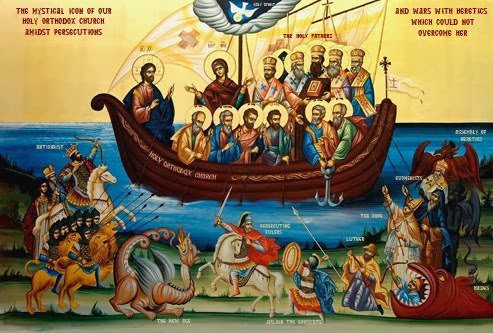In the Catholic Church, a bishop is an
ordained minister who holds the fullness of the sacrament of Holy Orders
and is responsible for teaching doctrine, governing Catholics in his
jurisdiction, and sanctifying the world and for representing the
Church. Catholics trace the origins of the office of bishop to the
apostles, who were endowed with a special charism by the Holy Spirit at
Pentecost. Catholics believe this special charism has been transmitted
through an unbroken succession of bishops by the laying on of hands in
the sacrament of Holy Orders.
Diocesan
bishops — known as eparchs in the Eastern Catholic Churches — are
assigned to govern local regions within the Church known as dioceses in
the Latin Church and eparchies in the Eastern Rites. Bishops are
collectively known as the College of Bishops and can hold such
additional titles as archbishop, metropolitan or primate.
Two
classes of bishops must be distinguished, not with regard to the power
of order, for all bishops receive the fullness of the
priesthood but with regard to the
power of jurisdiction: the
diocesan bishop and the
titular bishop or, as he was called before 1882 the
episcopus in partibus infedelium.
The former is here considered. Those belonging to the second class
cannot perform any episcopal function without the authorization of the
diocesan bishop; for as
titular bishops they have no ordinary
jurisdiction. They can; however, act as
auxiliary bishops, i.e. they may be appointed to assist a
diocesan bishop in the exercise of
duties arising from the episcopal order but entailing no
power of jurisdiction. (See
AUXILIARY BISHOP.) Such a bishop is also called
vicarius in pontificalibus, i.e. a representative in certain ceremonial acts proper to the
diocesan bishop, sometimes suffragan bishop,
episcopus suffraganeus. In the proper sense of the term, however, the suffragan bishop is the
diocesan bishop in his relations with the
metropolitan of the
ecclesiastical province to which he belongs, while the bishop who is independent of any
metropolitan is called an exempt bishop,
episcopus exemptus. The
titular bishop may also be coadjutor bishop when he is appointed to assist an ordinary bishop in the administration of the
diocese. Sometimes he is incorrectly called
auxiliary bishop. He possesses some powers of
jurisdiction determined by the letters Apostolic appointing him. Often also, notably in missionary countries, the coadjutor bishop is named
cum jure successionis, i.e. with the right of succession; on the death of the
diocesan bishop he enters on the ordinary administration of the
diocese.
The
Council of Trent
determined the conditions to be fulfilled by candidates for the
episcopate, of which the following are the principal: birth in lawful
wedlock, freedom from censure and irregularity or any defect in mind,
purity of personal
morals, and good reputation. The candidate must also be fully thirty years of age and have been not less than six months in
Holy orders. He ought also to have the
theological degree of Doctor or at least be a licentiate in
theology
or canon law or else have the testimony of a public academy or seat of
learning (or, if he be a religious, of the highest authority of his
order) that he is fit to teach others (c. vii, De electione et electi
potestate, X.I. vi; Friedberg, II, 51. Council of Trent. Sess. XXII, De
ref., ch. ii).
